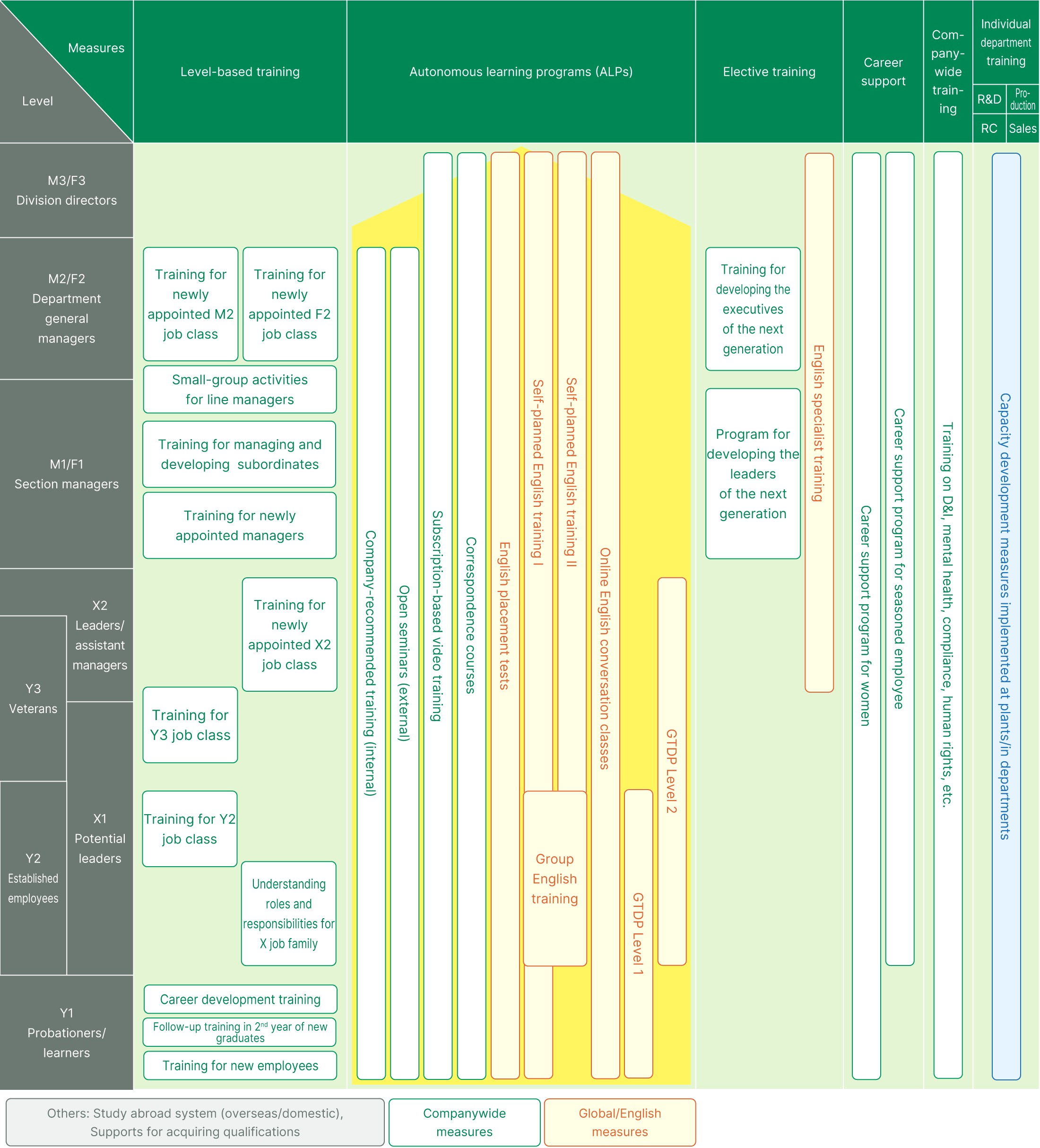Developing/Promoting the Active Participation of Talents
Human resources management system
To promote our transformation into a company where diverse talent can flourish as they work in a constantly growing organization, we have established a human resources management system that encourages employees to think and act on their own and leverages their individual qualities and attributes. Our system aims to foster the personal motivation to grow by empowering ambitious, skilled employees to pursue more important roles and greater responsibilities as soon as they wish to.
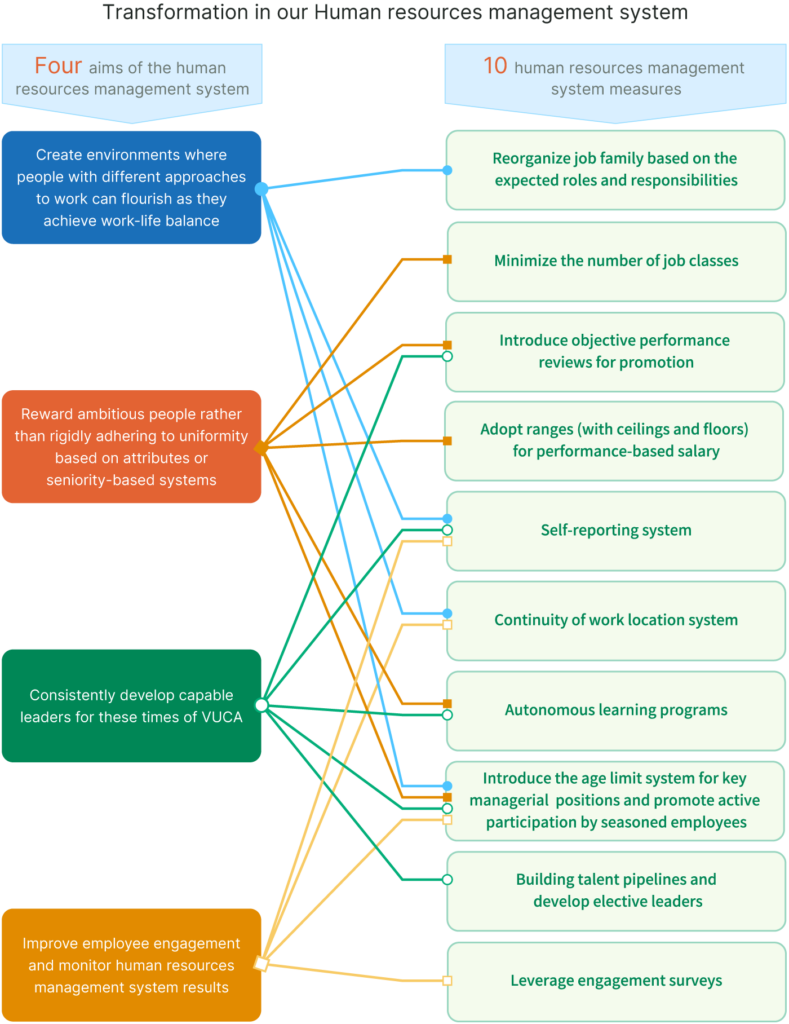
Concept of our Human resources management system: “think and act” and diversity
We have established three core human resources management systems based on the concept of “think and act” and diversity.
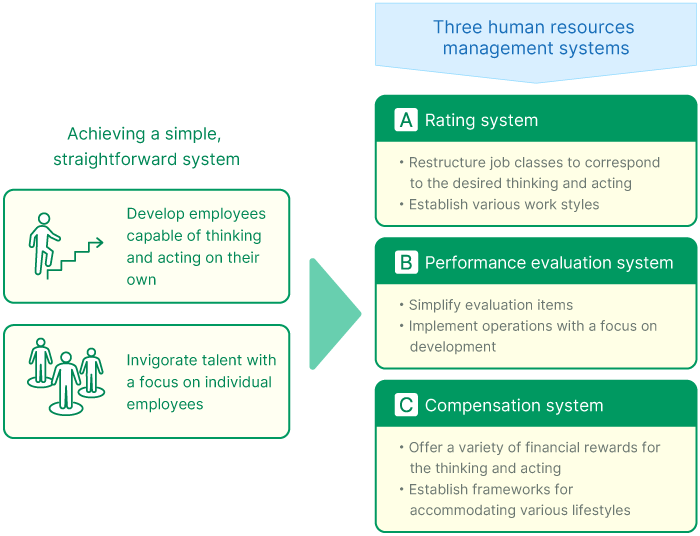
Systems that promote the invigoration of human resources with a focus on individual employees
Self-reporting
Each employee writes down own vision of career development and has a consultation with supervisor once each year.
This provides opportunities for employees to think about their careers in addition to helping the Company understand employees’ thoughts and circumstances, information the Company can use to develop employees and examine ways to get them more actively involved.
The continuity of work location
We have introduced the continuity of work location system as a measure to promote diverse work styles and to secure talent.
Employees who would like to avoid changing work locations for childcare, nursing care, or other personal reasons may continue to work at their current office for as long as they wish.
Administering engagement surveys
Once each year, we administer an engagement survey to all employees to enhance their engagement by providing assistance for group invigoration activities at each workplace. The survey results are used to quantitatively evaluate the circumstances of each organization, and division leaders clarify organizational challenges and take steps to improve on them. This leads to the improvement of organizations and engagement as we administer progress surveys to verify the impact of the measures.
Promoting active participation by seniors
We provide training that helps seasoned employees reflect on their careers and consider ways to exhibit their strengths to the fullest to enable them to work independently over the long term as we approach an era in which people live for 100 years. We are also working on measures to support career independence, for example enrolling employees in a practical program that allows them to experience working for other companies without giving up their current positions.
Talent development
Overall vision for talent development

Talent Development Policy
The Nippon Shokubai Group views employees as essential assets based on the recognition that people are the source of constant value creation.
The following three points are the focus of our talent development.
- Utilizing the individuality, willingness, and abilities of diverse talent
- Providing support to talent who think, act, and grow on their own initiative
- Fairly evaluating and rewarding employees under company systems
To become a chemical company that continuously evolves based on an acute awareness of changes in society, we implement and promote the invigoration of talent with a focus on individual employees so that they can exhibit their individual strengths to the fullest.
Ideal talent
In talent development, the Company and employees are on equal footing; the Company provides employees with opportunities for growth and expects them to have high aspirations and motivation to grow as well as to contribute to the Company.
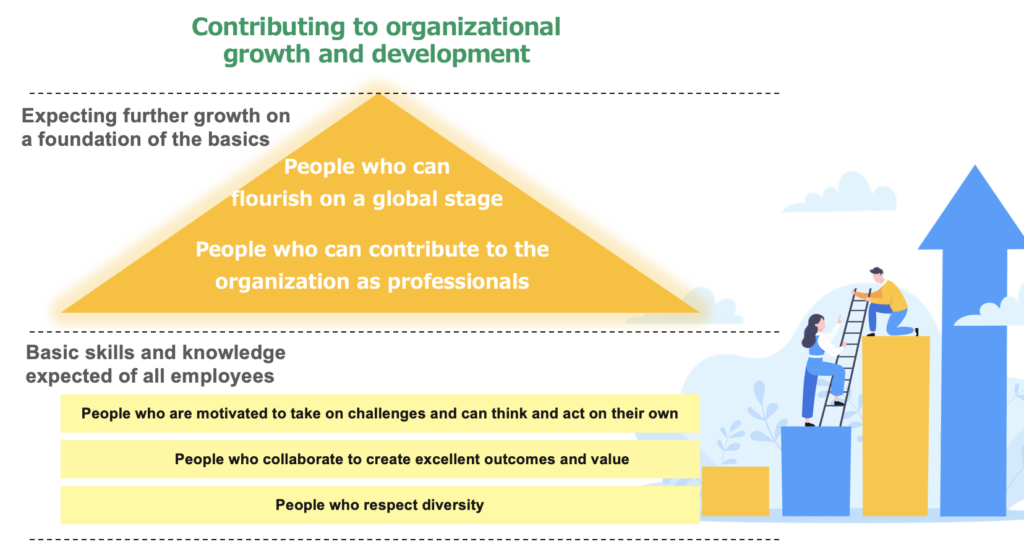
Definition of ideal talent
Respect for Diversity & Inclusion
People who respect and acknowledge each other’s differences and can contribute organizations where everyone can grow and flourish. People who can improve productivity by enhancing the psychological safety of organizations.
Collaboration
People who as members of an organization can create synergy by cooperating with other members to achieve a goal. People who can work to maximize organizational value through effective communication within the organization.
Challenge & Action
People who interpret things positively and can think and take action on their own. People who can facilitate individual and organizational development by taking on challenges without fear of failure.
Professional
People who can contribute to the organization as professionals with a sense of pride and responsibility for their job. Also, people who proactively work to improve their skills with the aim of becoming professionals.
Globalization
- People who can adapt flexibly to changes in the external environment based on an awareness and understanding of global standards (e.g. international standards, rules, ideas, systems).
- People who can use their understanding of foreign cultures as well as their linguistic ability and other components of effective communication to expand their fields of expertise in addition to creating opportunities and produce results for organizational development.
Talent development system
On-the-job training (OJT) is the basis of employee growth and the foundation of learning from working experience in actual positions and workplaces. The process promotes growth as trainees receive support from their supervisors and fellow employees. We concurrently create opportunities for off-the-job training—learning from training and other experiences outside the workplace—to foster among each and every employee the motivation to create a vision of the person they want to be in terms of ideal talent and to enhance their own value to achieve that vision.
Developing autonomous talent
We promote the development of autonomous talent who find their own purpose and take the initiative to work toward solutions rather than waiting for instructions. We visualize the skills required for each job family and advancement in terms of the definition of the different job classes under the Human resources management system and the matters considered for advancement. In addition to ongoing level-based training, we provide opportunities for each and every employee to apply their skills in systematic learning to progress toward the next level. Specifically, we have enhanced Company-recommended training named “autonomous learning programs (ALPs)” in which employees can choose and participate in order to improve their skills and abilities, and have made other efforts to establish a system allowing everyone to develop their capacities effectively and efficiently.
Developing talent for leaders
We are implementing a variety of measures to cultivate leaders who can drive the organization.
Specifically, we offer training to develop the executives and leaders of the next generation who will bring innovation to the Company. We have also extended invitations to roundtable management discussions—previously conducted for general managers throughout the Company—to section managers as well, and are conducting manufacturing manager training, which lasts 18 months and specializes in developing potential section managers for manufacturing divisions.
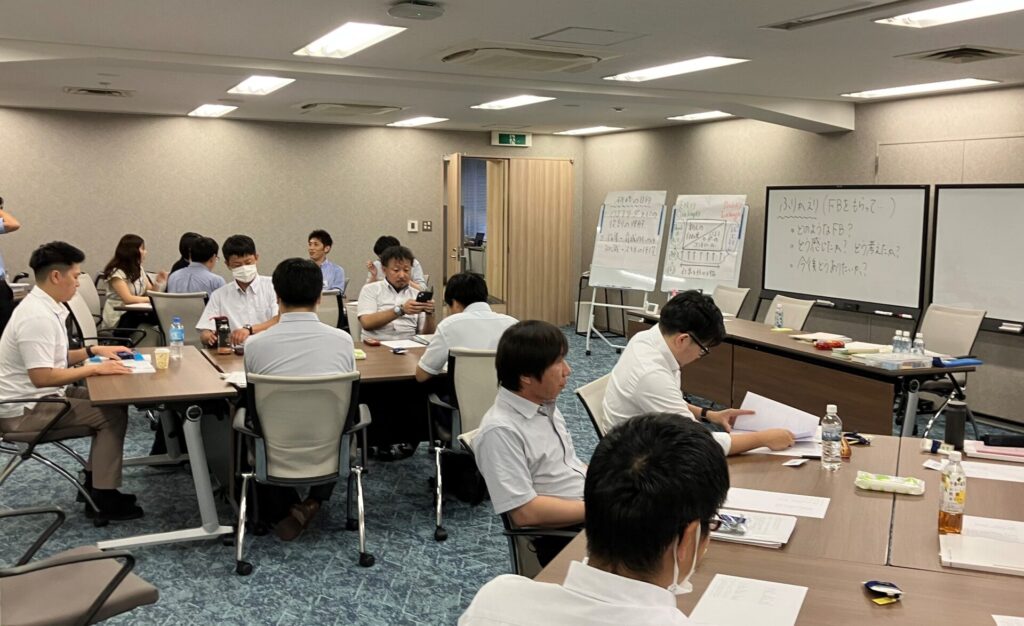
Developing talent who will be active Globally
Nippon Shokubai has over 14 overseas affiliated companies, in which over 50 Japanese expatriates are working. As our overseas sales revenue accounts for around 50% of our Group’s total sales, it is increasingly important to develop talent who can play active roles on a global scale. We have a program to dispatch young employees to our overseas affiliates as trainees for short periods of time, and also use foreign trainers to provide training for employees who are likely to be seconded overseas to give them various multicultural skills, such as cross-cultural communication, presentation and negotiation skills.
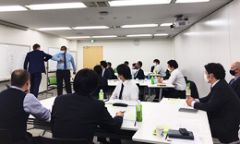
Promoting work-life balance
Providing balanced assistance for work, child care and nursing care
To create a better environment that supports employees with their parenting and nursing responsibilities while employed, we are working to establish systems and raise the awareness of our employees. We have published a guidebook that summarizes our balanced support system to keep the users of the system informed, while working to improve the system so that users can easily obtain the understanding of and cooperation from their superiors and coworkers.
We have also introduced a 15-day paid leave system to encourage men to take childcare leave.
* Number of persons taking childcare leave of absence: 50 (FY 2022 total)
* Percentage of male employees taking childcare leave : 51% (FY 2022)
* Return rate from child care leave of absence : 100% (FY2022)
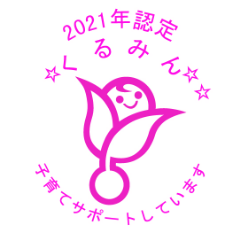
Reducing overtime work hours and encouraging the taking of leave
At Nippon Shokubai, the Working Hours Management Committee has been established by both labor and management to check the monthly overtime work hours of each employee and endeavor to reduce them by enhancing the teleworking and flextime systems. Employees who have worked long hours are encouraged to speak with an industrial physician or receive a health check via a medical questionnaire every month. Based on the results of the health check, the employee’s supervisor receives guidance or instructions from the industrial physician.
To encourage employees to take paid leave, the company has introduced a system to allow paid leave to be taken by the hour. We will continue to make efforts to create a working environment friendly to employees by paying attention to their work-life balance.
* Average monthly overtime hours per person: 15 hours (FY2022)
* Percentage of annual paid leave taken: 88% (FY2022)
Promoting mental and physical health management
To maintain and improve the mental and physical health of our employees, we have introduced various measures to help them to manage their health. Administered by our industrial physicians and occupational health staff, these efforts revolve around the health promotion office in each of our business offices. Specifically, we conduct general and specialized health examinations and provide tailored health advice in cooperation with the Nippon Shokubai Health Insurance Union. Together, we arrange health checks with dentists in addition to family health checks and the like. We also offer educational activities such as in-house lectures and physical strength measurement sessions on a regular basis.
We have formulated a Mental Health Plan aimed at staving off mental and physical illnesses. At the same time, we are working to improve productivity and create a bright and lively workplace by providing stress checks and level-based training focusing on mental health education for all employees. In FY2019, we held 10 sessions of line care training targeting around 550 managers throughout the company. In FY2021 and FY2022, we provided web video training to young people and mid-career employees, respectively.
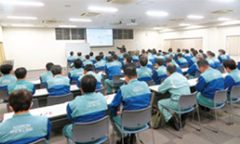
Toward a sound labor-management relationship
Nippon Shokubai and the Nippon Shokubai Labor Union, a member of the Japanese Federation of Energy and Chemistry Workers Unions, maintain a dialogue based on mutual respect as their basic stance. Respecting the three rights of labor and through a good labor-management relationship based on mutual understanding and trust, we are addressing the resolution of various issues and achievement of goals through cooperation. Regarding collective bargaining, we have specified the scope of negotiations, procedures, the method of settlement, and other matters in collective labor agreements so that various issues can be properly solved and overcome through dialogue. Moreover, meetings of the central labor-management council and meetings of the branch labor-management council at each plant are held periodically as forums for exchanging opinions between labor and management. The company and the union have concluded a union shop agreement under which all our general employees join the union.
